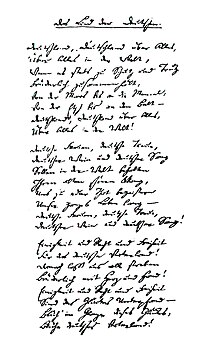ဂျာမနီနိုင်ငံ သီချင်း
ဂျာမနီနိုင်ငံသီချင်း (ဂျာမန်: Deutschlandlied) တရားဝင်အားဖြင့် ဂျာမန်အမျိုးသားများ၏သီချင်း (Das Lied der Deutschen) သည် ဂျာမနီနိုင်ငံ၏ နိုင်ငံတော်သီချင်းတစ်ပုဒ်ဖြစ်ပြီး ၁၉၂၂ စတင်သုံးစွဲခဲ့သည်။ ၁၉၄၉ မှ ၁၉၉၀ ခုနှစ်များအတွင်း အရှေ့ဂျာမနီ၏ နိုင်ငံတော်သီချင်းမှာ "အပျက်အစီးများမှ ထကြွလာပြီ" (Auferstanden aus Ruinen) ဟူ၍ဖြစ်သည်။
| English: The Song of Germany | |
|---|---|
 ဟော့ဖမန်း ဗွန် ဖာလာစ်လေဘန်၏ သီချင်းအတွက်စာသား | |
| အခြားအမည် | Das Lied der Deutschen ဂျာမန်အမျိုးသားများ၏သီချင်း (အင်္ဂလိပ်: The Song of the Germans) |
| စာသား | ဩဂတ်စ် ဟိုင်းနရစ် ဟော့ဖမန်း ဗွန် ဖာလာစ်လေဘန်, ၁၈၄၁ |
| ဂီတ | ဂျိုးဇက် ဟိုင်းဒင့်, ၁၇၉၇ |
| အတည်ပြုခြင်း | ၁၉၂၂–၁၉၄၅ |
| ပြန်လည်အတည်ပြုခြင်း | ၁၉၅၂ |
| ယခင်သီချင်း |
|
| အသံနမူနာ | |
အမေရိကန်ပြည်ထောင်စုကြည်းတပ် ဥရောပဘင်ခရာနှင့်သံပြိုင်အဖွဲ့မှ တီးခတ်မှု(တစ်ပိုဒ်သာ) | |
ဒုတိယကမ္ဘာစစ်အပြီး နာဇီဂျာမနီကျဆုံးပြီးနောက် တတိယပိုဒ်ကိုသာ နိုင်ငံတော်သီချင်းအဖြစ် အသုံးပြုခဲ့သည်။ ၎င်း၏ အချီသောစာသားဖြစ်သော "စည်းလုံးညီညွတ်မှု၊ တရားမျှတမှုနှင့် လွတ်လပ်မှု" (Einigkeit und Recht und Freiheit) ကို ဂျာမနီနိုင်ငံ၏ တရားဝင်မဟုတ်သော အမျိုးသားဆောင်ပုဒ်အဖြစ် ယူဆထားသည်။[၁]
တေးသံသည် ဩစတြီးယန်းတေးရေးဆရာ ဂျိုးဇက် ဟိုင်းဒင့် မှ ၁၇၉၇ ခုနှစ်တွင် ရေးသားခဲ့သော ဧကရာဇ်ဖရန်စစ်ကို ဘုရားသခင် စောင့်ရှောက်ပါစေ (Gott erhalte Franz den Kaiser) ဟူသောသီချင်းဖြစ်ပြီး မြင့်မြတ်သောရောမအင်ပါယာနှင့် နောက်ပိုင်းတွင် ဩစတြီးယား၏ဘုရင်ဖြစ်သူ ဒုတိယဖရန်စစ်၏မွေးနေ့အတွက် ရေးစပ်ခဲ့ခြင်းဖြစ်သည်။ ၁၈၄၁ တွင် ဂျာမန်ဘာသာဗေဒပညာရှင်နှင့် ကဗျာဆရာ ဩဂတ်စ် ဟိုင်းနရစ် ဟော့ဖမန်း ဗွန် ဖာလာစ်လေဘန်သည် ဂျာမန်အမျိုးသားစည်းလုံးရေးကိုရှေးရှု၍ ထိုတေးသံအတွက် စာသားအသစ်များကိုရေးစပ်ခဲ့သည်။
ဝိုင်မာသမ္မတနိုင်ငံကာလအတွင်း ၁၉၂၂ ခုနှစ်တွင် "ဂျာမနီနိုင်ငံသီချင်း"ကို ဂျာမနီနိုင်ငံတော်သီချင်းအဖြစ် အသုံးပြုခဲ့သည်။ အနောက်ဂျာမနီနိုင်ငံသည် ၎င်း၏တရားဝင်နိုင်ငံတော်သီချင်းအဖြစ် ၁၉၅၂ ခုနှစ်တွင် ဆက်လက်ထိန်းသိမ်းထားခဲ့ပြီး တတိယအပိုဒ်ကို တရားဝင်အခါသမယများတွင် သီဆိုခဲ့သည်။ ၁၉၉၀ ခုနှစ်တွင် ဂျာမနီနိုင်ငံပြန်လည်ပေါင်းစည်းပြီးနောက် ၁၉၉၁ ခုနှစ်တွင် တတိယအပိုဒ်ကိုသာ နိုင်ငံတော်သီချင်းအဖြစ် ပြန်လည်အတည်ပြုခဲ့သည်။ ပထမအပိုဒ် (သို့မဟုတ် ဒုတိယအပိုဒ်) သီဆိုခြင်းကို နာဇီအစိုးရ သို့မဟုတ် ယခင်အမျိုးသားရေးစိတ်ဓာတ်များနှင့် နှီးနွှယ်မှုများကြောင့် အားပေးခြင်းမရှိပေ။
စာသား
ပြင်ဆင်ရန်တတိယပိုဒ် (အထူ) ကိုသာ ခေတ်သစ် ဂျာမန် နိုင်ငံတော်သီချင်းအဖြစ် အသုံးပြုသည်။
|
|
| ဂျာမန် | အိုင်ပီအေ | အင်္ဂလိပ်ဘာသာပြန် |
|---|---|---|
I[မှတ်စု ၂] |
1 |
I |